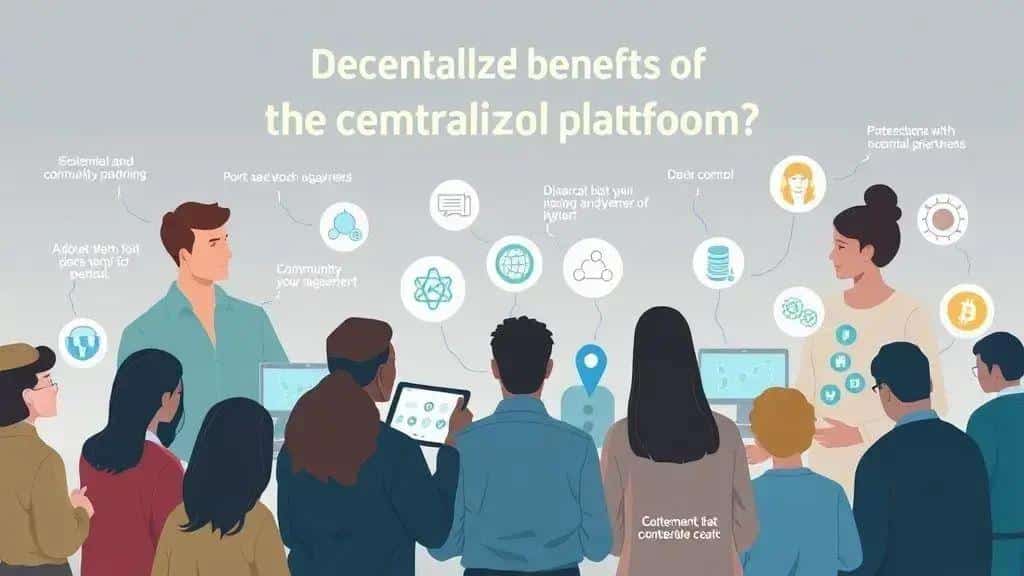Rise of decentralized social media platforms is changing the game

The rise of decentralized social media platforms prioritizes user privacy, control over data, and community engagement while also facing challenges like scalability and regulatory scrutiny.
The rise of decentralized social media platforms is reshaping the digital landscape, offering alternatives to traditional networks. Have you ever wondered how these platforms can enhance online privacy and user control? Let’s dive into what this shift means for us all.
Understanding decentralized social media platforms
Understanding decentralized social media platforms is crucial in today’s digital age. These platforms allow users to own their data and engage without centralized control. This shift is not just a trend; it’s a transformative approach to online interaction.
What are Decentralized Social Media Platforms?
Decentralized social media platforms operate on a model that distributes control among users rather than a central authority. Unlike traditional platforms, which often monetize user data, decentralized options focus on user autonomy and privacy.
Key Features
- User control: Users have full ownership of their content and data.
- Enhanced privacy: Data is less susceptible to mass collection and misuse.
- Community-driven: Decisions about the platform are made collectively by users.
This new model promotes trust, empowering users to share their thoughts without fear of censorship. With various platforms emerging, each offers unique features while adhering to the principles of decentralization.
One standout is Mastodon, which allows users to create their own servers and interact across diverse communities. Another is Diaspora, emphasizing user privacy and self-hosting. These platforms exemplify how decentralized social media can cater to individual needs while fostering community.
The Role of Blockchain
Blockchain technology plays a pivotal role in decentralized social media. It ensures transparency and security by recording all transactions in an immutable ledger. This enhances trust, as users can verify actions and interactions without relying on a centralized entity.
As we explore these platforms, it’s important to consider their potential to disrupt traditional media. By prioritizing user rights and redefining connectivity, they challenge the status quo and may inspire a more equitable internet for everyone.
Key benefits of decentralized platforms

Decentralized platforms offer a range of advantages that make them appealing to users and creators alike. These benefits reshape how we interact online, providing more freedom and security while encouraging community-building.
Improved Privacy
One of the most significant benefits of decentralized platforms is enhanced privacy. Users can keep their information secure because data is not stored in a central location. This prevents unauthorized access and potential misuse.
Greater Control
On decentralized platforms, users have complete control over their data. This means they can choose what to share and with whom. Such control fosters a sense of ownership and encourages responsible online behavior.
- User autonomy: Freedom to manage personal data.
- No single point of failure: Reduced risk of data breaches.
- Community governance: Users have a say in platform decisions.
These features empower users and promote a community-driven approach to social media. By participating, individuals contribute to a healthier online environment where everyone feels valued.
In addition, lower censorship levels are a crucial advantage. Users can express their opinions without fear of being silenced by a central authority. This freedom can lead to richer conversations and a diverse array of perspectives.
Cost Efficiency
Another advantage is cost-effectiveness. Traditional platforms often rely on advertisements or subscription fees, which can limit access. Decentralized platforms typically lower costs by leveraging shared resources and community contributions.
This efficiency opens doors for creators who may not have the means to thrive on traditional platforms. Now, they can share their work with a global audience without facing high barriers. These benefits make decentralized social platforms an exciting alternative for many.
Challenges faced by decentralized social media
Decentralized social media platforms offer exciting possibilities, but they also face many challenges. Navigating these issues is crucial to their success and longevity.
Scalability Issues
One major challenge is scalability. Many decentralized platforms struggle to handle a growing number of users. As more people join, the system can slow down, leading to poor user experiences. To combat this, developers need to find innovative ways to increase capacity while maintaining performance.
User Adoption
User adoption is another significant hurdle. Many users are accustomed to centralized platforms and may be hesitant to switch to decentralized options. Education is essential to help users understand the benefits of these platforms, including data ownership and privacy protection.
- Awareness: Users must learn about the existence and benefits of decentralized platforms.
- Familiarity: Overcoming the comfort of familiar centralized interfaces can be challenging.
- Trust: Users need to trust that decentralized platforms offer genuine benefits.
Developers can support user adoption through marketing efforts and community engagement. Building a strong community can create a welcoming environment where users feel comfortable exploring decentralized alternatives.
Regulatory Challenges
Another challenge is regulatory scrutiny. As decentralized platforms gain popularity, they may attract government attention. Regulations can vary widely by region, creating confusion for developers and users alike. Adapting to these rules while staying true to the decentralized ethos is essential.
These regulations may include content moderation, data protection, and user safety standards. Striking a balance between compliance and decentralization emphasizes the need for flexible strategies that accommodate various regulatory environments.
Despite these challenges, decentralized platforms show enormous potential. By addressing issues like scalability, user adoption, and regulatory hurdles, they can create a more equitable and decentralized internet.
Future trends in decentralized social networking

Future trends in decentralized social networking promise exciting developments for users and creators alike. As technology evolves, so do the possibilities for how we connect online. These trends aim to enhance user experience and foster innovation.
Increased Interoperability
One key trend is increased interoperability between platforms. As decentralized social networks become more popular, users will expect to interact seamlessly across different services. This means that users can share content, messages, and profiles between platforms without constraints.
Enhanced Privacy Features
Privacy will continue to be at the forefront of decentralized social networking. Future platforms are likely to implement advanced encryption methods to protect user data and enhance security. Users will have more options to customize privacy settings and manage their personal information.
- Granular privacy controls: Users may choose who sees what parts of their profiles.
- End-to-end encryption: Conversations will become more secure and private.
- Anonymous interactions: Users can connect without revealing personal identities.
With these advancements, trust in decentralized platforms may grow, attracting more users who value privacy and data security.
AI Integration
Another trend is the integration of artificial intelligence (AI) into decentralized platforms. AI can enhance user experience by providing personalized content suggestions and improving interaction efficiency. AI-driven features can help filter content and enhance community engagement.
As AI becomes more prevalent, we may see smarter moderation tools that keep communities safe without sacrificing freedom of expression. These tools can identify harmful content while respecting user privacy, creating a balanced approach to moderation.
Community Governance Models
The future will also see the rise of innovative community governance models. Many decentralized networks are experimenting with how users can have a voice in decision-making processes. This could involve voting on platform changes or contributing to community guidelines, fostering a stronger sense of ownership among users.
In these models, users become more than just participants; they are integral to shaping the future of their platforms. This participation can create a more engaging and supportive environment, where users feel empowered to contribute positively.
In conclusion, the rise of decentralized social media platforms is transforming how we connect and share experiences online. With their focus on privacy, user control, and community engagement, these platforms offer a promising alternative to traditional networks. However, challenges like scalability and user adoption remain. As we look to the future, trends such as interoperability, enhanced privacy, AI integration, and community governance will shape decentralized social networking. By addressing these challenges and embracing innovative solutions, we can build a more inclusive and equitable digital landscape for everyone.
FAQ – Frequently Asked Questions about Decentralized Social Media Platforms
What are the main benefits of decentralized social media platforms?
Decentralized social media platforms provide enhanced privacy, user control over data, reduced censorship, and community-driven moderation.
How do decentralized platforms ensure user privacy?
These platforms often use encryption and allow users to manage their own data, making it less vulnerable to unauthorized access.
What challenges do decentralized social media platforms face?
Challenges include scalability issues, user adoption, regulatory scrutiny, and the need for effective moderation.
What trends can we expect in the future of decentralized social networking?
Future trends include greater interoperability, enhanced privacy features, AI integration for user experience, and innovative community governance models.





